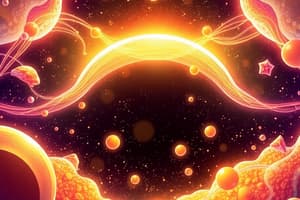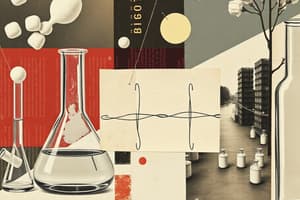Podcast
Questions and Answers
يتم استخدام اختبار سيليوانوف لتمييز بين السكريات الألدوزية والكيتونية.
يتم استخدام اختبار سيليوانوف لتمييز بين السكريات الألدوزية والكيتونية.
True
السكريات الكيتونية تؤدي إلى تكوين مجموعة ألديهيد عندما تتعرض للحرارة.
السكريات الكيتونية تؤدي إلى تكوين مجموعة ألديهيد عندما تتعرض للحرارة.
False
يحتاج اختبار سيليوانوف ريسورسينول كعامل مساعد.
يحتاج اختبار سيليوانوف ريسورسينول كعامل مساعد.
True
ينتج عن تفاعل حمض الهيدروكسي ميثيل فورفورال مع ريسورسينول لون أزرق داكن.
ينتج عن تفاعل حمض الهيدروكسي ميثيل فورفورال مع ريسورسينول لون أزرق داكن.
Signup and view all the answers
تتأثر السكريات الألدوزية vyt بخواصها الكيميائية عندما تتعرض للحرارة.
تتأثر السكريات الألدوزية vyt بخواصها الكيميائية عندما تتعرض للحرارة.
Signup and view all the answers
Study Notes
اختبار سليوانوف
- اختبار سليوانوف يستخدم لتمييز بين السكارات الألديهي (Aldose) والسكارات الكيتوني (Ketose)
- السكارات الكيتوني تتميز بوحدتها الكيتوني/الألديهي فيขณะท أن السكارات الألديهي تتميز بوحدتها الألديهي
- اختبار سليوانوف يستند إلى حقيقة أن السكارات الكيتوني تفقد الماء بشكل أسرع من السكارات الألديهي عندما يتم تسخينها
- عندما تفقد السكارات الكيتوني الماء، فإنها تنتج.hexoses ketone (هيدروكسي ميثيل فورفورال) والذي يعطي لون أحمر خاتم كيرازي عندما يتفاعل مع مادة ريزورسينول (Resorcinol) في اختبار سليوانوف
Studying That Suits You
Use AI to generate personalized quizzes and flashcards to suit your learning preferences.
Description
The lungs are situated so that one lies on each side of the mediastinum. They are therefore separated from each other by the heart and great vessels and other structures in the mediastinum. Each lung has a blunt apex, which projects upward into the neck for about (2.5 cm) above the clavicle; a concave base that sits on the diaphragm; a convex costal surface,which corresponds to the concave chest wall; and a concave mediastinal surface, which is molded to the pericardium and other mediastinal structures. At about the middle of this surface is the hilum, adepression in which the bronchi, vessels, and nerves thatform the root enter and leave the lung. The root of the lung is formed of structures that are entering or leaving the lung. It is made up of the bronchi,pulmonary artery and veins, lymph vessels, bronchial vessels, and nerves.




